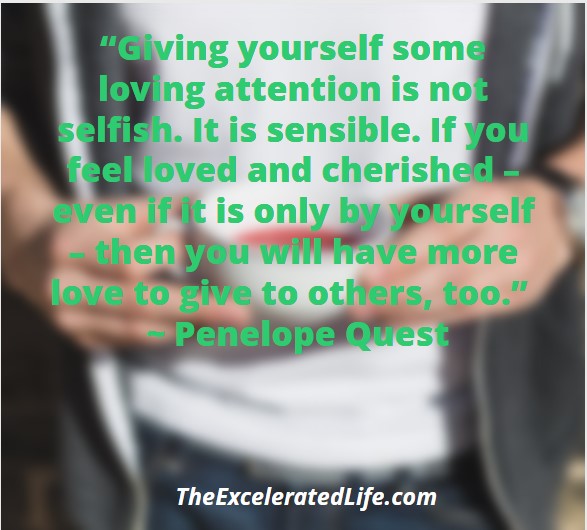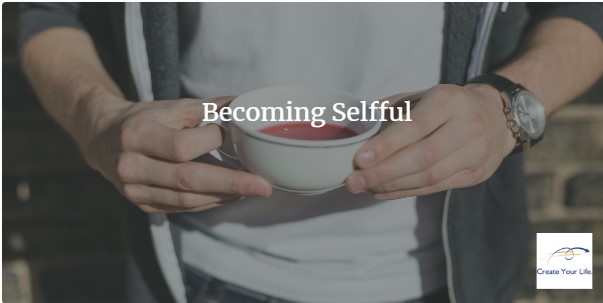Selffulness is taking the responsibility to know one’s own needs and to get them met while acknowledging and being of service to others. Excelerated Selffulness™ requires that we take excellent care of ourselves, not for selfish reasons, but so that we can give our best in Service to the world as we seek to fulfill our larger purpose.
TheExceleratedLife.com

Refilling The Pitcher
Imagine you are hosting a large dinner party. You have a table set with 12 glasses. Each glass holds 8 ounces. Now suppose you have a two-quart pitcher of water (or, for those of us who live in the South, sweet tea). In preparation for the party, you are filling the glasses from the pitcher. (For non-math majors, a two-quart pitcher holds 64 ounces of liquid.) It soon becomes apparent that you are not going to have enough to fill all 12 glasses. You’re going to need to stop to refill the pitcher.
You wouldn’t think of yourself as being selfish because you had to stop filling the glasses. In fact, there is nothing else to do but to refill the pitcher. So it is with Excelerated Selffulness. You aren’t being selfish when you take the time to care for yourself. In fact, that’s the only way you can continue giving your best to the world.
Selfish > Selfless > Selfful
Let’s examine the concepts of selfish, selfless, and selfful.
Selfish is focusing only on the needs of oneself.
Selfless is focusing exclusively on the needs of others.
Selffulness is taking the responsibility to know one’s own needs and to get them met while acknowledging and being of service to others.
Some might see becoming selfful as a progression, from selfish to selfless to selfful. Or you could look at it as the mean between two extremes: selfish – completely self-focused <> selfful – a balance between self and others <> selfless – completely other-focused.
Obstacles To Becoming Selfful
Of course, if selffulness were easy, we’d all be doing it already. But, like most good things, there may be obstacles standing in the way. Here are a few. [Loberg]
Feeling guilty. Most of us have been trained from an early age to not be selfish. We judge being selfish as being “bad”. Unfortunately, the only other option we are usually given is to put others ahead of ourselves – to be selfless. Even though selffulness is vastly different from selfishness, if we haven’t learned to make that distinction, we feel guilty caring for ourselves.
Finding time for self-care. This can be especially true for busy moms and working mothers, but it applies to any busy person juggling a career, a family, a home, and looking to find a balance. There are so many legitimate demands on your time, it is hard to find moments to care for yourself. But you can’t pour from an empty pitcher. Caring for yourself is necessary if you are to properly care for others and to address the other important areas of your life.
Putting others’ needs first. This is the definition of selflessness. And we already know where that leads. Learn to set boundaries where you need them and say “no” when it is appropriate.
Benefits Of Becoming Selfful
I’m going to assume that you lean more toward selflessness than selfishness, which is the case for most of us. This isn’t to say a selfish person cannot move toward selffulness, but the methods and mindset are different, and I won’t cover those here.
Think of becoming more selfful as investing in yourself, just as you might invest in education to improve your mind or in a fitness regimen to improve your physical health. Learning to become selfful is another way to grow and develop, to learn more about yourself and your needs. As we better know and care for ourselves, we “show up more powerfully and make our unique contribution to the greater good.” [Breslin]
We all need solitude and “alone time”, time to be with ourselves and our thoughts. While we are busy caring for the other people with whom we are in relationships – spouses, children, family members, friends, clients – we need to make time to pay attention to ourselves, too. We need this time to connect with ourselves, fill our reserves, and come back ready to give our best to those around us. [Niewiadomska]
Be Full Of Yourself
In her blog discussing the concepts of selfish, selfless, and selfful, Ipek Williamson relates a conversation between a mother and her 8-year old daughter. [Williamson]
Mom: “Jenny, you are so full of yourself!”
Jenny: “Who else would I be full of?”
So it is for each of us. If we aren’t full of ourselves, we are running on empty. If we aren’t full of ourselves, we cannot give our best in Service to our world. You cannot pour from an empty pitcher. Be full of your self.
“I Love You” Begins With I
In the mornings, during my time of meditation, I use a LovingKindness meditation which I have adapted and added to over the years. It goes like this.
May I be filled with LovingKindness.
May I be safe from all inner and outer danger.
May I be healthy and well in body, mind, and spirit.
May I love and be loved.
May I be at peace.
May I prosper and flourish and be filled with hope.
May I be blessed.
I then repeat the litany naming various family members and friends, then expanding to my neighborhood, my community, and finally to all beings.
But it always starts with “I”. This is not selfishness but selffulness. Excelerated Selffulness™ requires that we take excellent care of ourselves, not for selfish reasons, but so that we can give our best in Service to the world as we seek to fulfill our larger purpose. That is embracing the Excelerated Life™!
Excelerated Selffulness™ — taking excellent care of yourself — is one step in creating your Excelerated Life™, a life of flourishing and well-being, and a life of meaning, purpose, and service..
Read more about the Excelerated Life™.
Resources:
Breslin, Shane. “On Self-fulness.” Shane Breslin. Shane Breslin,. Web. December 7, 2020.
https://www.shanebreslin.com/daily/on-self-fulness/
Loberg, Erica. “Selfish vs. Self-full – Knowing the Difference.” Psych Central. Psych Central, 3 Apr 2013. Web. December 10, 2020.
https://blogs.psychcentral.com/manic-depression/2013/04/03/selfish-vs-self-full-knowing-the-difference/
Niewiadomska, PhD., Kat. “Why Being Selfful is Important.” Linked In. LinkedIn Corporation, May 4, 2015. Web. December 10, 2020.
https://www.linkedin.com/pulse/why-being-selfful-important-kathy-shalhoub/
Williamson, Ipek. “Selfish, Selfless or Selfful?” Ipek Williamson Coaching. Ipek Williamson Coaching, January 17, 2020. Web. December 10, 2020.
https://ipekwilliamsoncoaching.com/2020/01/17/selfish-selfless-or-selfful/



One Reply to “Becoming Selfful”